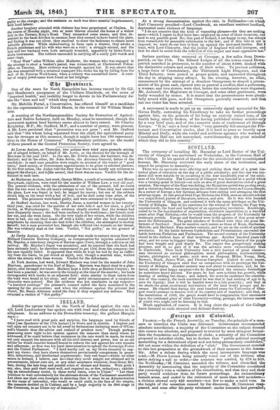IRELAND.
Amidst the uproar raised in the North of Ireland against the rate in aid, Lord Londonderry has spoken out with loud and clear adhesion to his allegiance. In an address to his Downshire tenantry, the gallant Marquis says— I have read with great pain and surprise, the language used by friends of mine [see Spectator of the 17th instant] in Down and in Antrim. I implore and call upon my tenantry not to be led away by declarations imitating more of O'Con- nell's blusters than the advice and counsel of prudent men." Though perhaps possessing more right to his opinion against the measure than many whom he addressed, if he could believe that resistance to the rate would be made, he would not only support the measure with all his civil interest and power, but as an old soldier he would consider himself bound to enforce the law against his own tenants and adherents; so firm was his loyal determination to uphold the Sovereign Power and the United Parliament. " 1. need hardly call on my Down tenantry to sup- port my views: they have shown themselves preeminently conspicuous m peace- able, industrious, and intellectual acquirements: they can boast—which no other estate in Ireland, I believe, can do—that they never sought nor obtained aid in presentments, labour-rate act, or any other assistance whatever, from Great Bri- taio, during the late long and painful crisis of disease and famine. With pride I say, also, they paid their rents well, and required no, or few, reductions; exhibit- ing an extraordinary model, in these woful times, even to Ulster." "Let them continue to wait submissively for the ultimate decree of the Parliament assembled. Let them use their own foresight in detecting that it must be an Administration on the verge of imbecility, who would or could yield, in the face of the empire, the measure decided on in Cabinet, and by a large majority in its first stage in the Commons, to an Ulster cry of resistance."
At a strong demonstration against the rate, in Ballinasloe—at which. Earl Clancarty presided—Lord Clonbrook, an excellent resident landlord, deprecated mere violence of language. " I do not conceive that the kind of vapouring phrases—for they are nothing more—which I regret to find have been employed on some of those occasions, can tend to any possible good. No; this part of Ireland, I am happy to say, has always been remarkable for peaceable submission to the law; and if this rate in aid is imposed, we must do our best to bear up against the increased burden. But I trust, with Lord Clancarty, that the justice of England will still interpose, and that we shall be saved from the infliction of this unjust and most oppressive tax."
Serious partisan riots occurred at Crossgar, a few miles from Down- patrick, on the 17th. The Riband Lodges of all the towns round Down- patrick marched in procession, to the number of about 8,000, decked with the distinctive colours and insignia of their order. To prevent collisions, a large force of Constabulary, the Thirteenth Light Dragoons, and the Third Infantry, were posted at proper points, and succeeded throughout the day in stopping many affrays. In the evening, however, an affair, commenced by the attempt of a drunken Orangeman to despoil a proces- sionist of his green sash, ripened into so general a conflict, that a policeman, a woman, and two rioters, were shot, before the combatants were dispersed. Mr. Anketell, the Magistrate at Crossgar, and some other gentlemen, were badly wounded by stones. It is stated that the processionists were plenti- fully armed with guns, and the Orangemen generally unarmed; and that not one rioter has been arrested.
A movement is made to get up an extensively signed memorial for Mr. Gavan Duffy, entreating his Excellency to take no further proceedings against him, on the grounds of his being an entirely ruined man, of his health being utterly broken, of his having published violent articles only for a very brief time, and of the excessive state of excitement all through Europe. "It is," says a local writer, " very generally felt amongst the Pro- testant and Conservative circles, that it is hard to press so heavily upon Mitchel and Duffy, while the sordid and seditious agitators who worked at Conciliation Hall are left untouched, notwithstanding the great mischief which they did to this country."


























 Previous page
Previous page